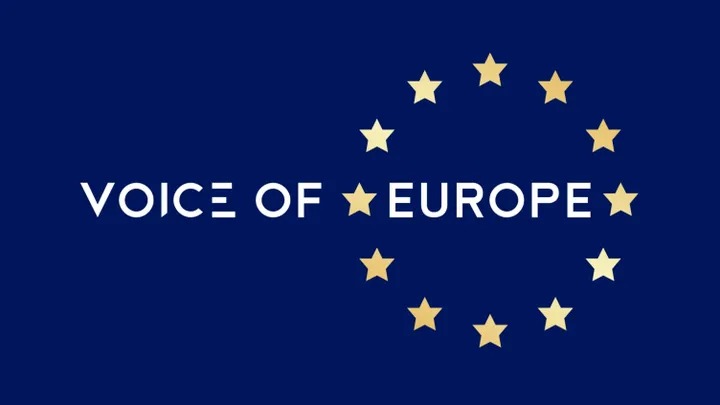EU imposes sanctions on Russian propaganda arm Voice of Europe, and figures behind it – Medvedchuk and Marchevskyi
The EU has imposed sanctions on Voice of Europe, a Russian propaganda tool, and two actors behind it, Putin's crony Viktor Medvedchuk and Artem Marchevskyi.


On 27 May, the Czech Foreign Ministry reported on X/Twitter that the European Union has imposed sanctions on the Czech-registered Russian propaganda outlet Voice of Europe, along with two major figures who used to run it, pro-Russian businessmen Viktor Medvedchuk and Artem Marchevskyi. This action comes at the suggestion of the Czech Republic.
Ukrainian oligarch Viktor Medvedchuk, often referred to as Russian President Vladimir Putin’s crony in Ukraine, was arrested and later exchanged to Russia in 2022. Ukrainian and Israeli national Marchevskyi, a long-time associate of Medvedchuk, served as the general producer of Medvedchuk-owned TV channel 112, which was sanctioned by the Ukrainian government in 2021 for spreading Russian propaganda.
According to the Czech Ministry of Foreign Affairs, Voice of Europe is “a tool of Russian propaganda” that Russia used in attempts to influence elections to the European Parliament. The Ministry says that Medvedchuk and Marchevskyi are behind this Russian influence operation.
The EU sanctions entail a ban on Medvedchuk and Marchevskyi entering or transiting through any of the 27 EU member states. Additionally, all funds and economic resources belonging to the three sanctioned entities have been frozen across the entire EU.
The Czech Republic had already applied these same restrictions domestically in March. However, with the entities now sanctioned at the EU level, the restrictions are valid throughout the bloc.
The Czech Ministry of Foreign Affairs, which cooperated with Czech intelligence and financial authorities on this case, celebrated it as “the success of Czech diplomacy.” They stated the sanctions “will greatly complicate any further activities” of Voice of Europe and those behind the Russian influence operation.
The Ministry warned that “Czech diplomacy is still ready to cut off other tentacles of the Kremlin at the European level.”
“Voice of Europe”
On 27 March, Marchevskyi and Medvedchuk were placed on a Czech sanctions list, following which the Facebook page and YouTube channel of Voice of Europe went silent.
Czech authorities have accused the Voice of Europe website, registered in Prague in 2016, of spreading Russian propaganda and bribing European politicians. According to Czech investigators, the site operated as a platform for Kremlin disinformation campaigns, was involved in channeling funds to political candidates across several European countries, and offered a platform for fringe candidates, aiming to influence the outcome of the upcoming European Parliament elections in June.
Among those suspected of receiving bribes via Voice of Europe is German politician Petr Bystron, a member of the far-right Alternative for Germany (AfD) party. He reportedly was under investigation for his alleged involvement in a Russian influence operation targeting EU countries, with media reports suggesting that Bystron might have received financial support from a pro-Russian network.
Media investigations reveal that Russian funds amounting to hundreds of thousands of euros have been funneled to various European politicians, including at least one AfD parliamentarian, all purportedly connected to a network affiliated with a close ally of Russian President Vladimir Putin.
After the imposition of Czech sanctions, Slovakia granted temporary protection to Artem Marchevskyi in early May, amid the pro-Russian stance of Slovak Prime Minister Robert Fico.
On 17 May, the Council of the European Union decided to “suspend the broadcasting activities” in the EU of four media outlets, spreading Russian propaganda – Voice of Europe, RIA Novosti, Izvestia and Rossiyskaya Gazeta. Back in early March 2022, the EU Council banned the Russian propaganda outlets RT (Russia Today) and Sputnik in the EU.
Read also:
- EU Council bans Russia’s RIA Novosti, Izvestia, Rossiyskaya Gazeta, and Medvedchuk’s Voice of Europe
- Russia suspected of funneling funds to Germany’s AfD party for pro-Russian messaging
- EU to sanction four Russian media outlets to combat Russian propaganda
- Slovakia grants temporary protection to Ukrainian accused of running pro-Russian influence campaign
- MEPs call to investigate Russia’s bribery of EU politicians
- European agencies sound alarm over Russian sabotage plots, FT says
- Zelenskyy strips four Ukrainians charged with treason, including “Putin’s point man,” of citizenship
You could close this page. Or you could join our community and help us produce more materials like this.
We keep our reporting open and accessible to everyone because we believe in the power of free information. This is why our small, cost-effective team depends on the support of readers like you to bring deliver timely news, quality analysis, and on-the-ground reports about Russia's war against Ukraine and Ukraine's struggle to build a democratic society.
A little bit goes a long way: for as little as the cost of one cup of coffee a month, you can help build bridges between Ukraine and the rest of the world, plus become a co-creator and vote for topics we should cover next. Become a patron or see other ways to support.



